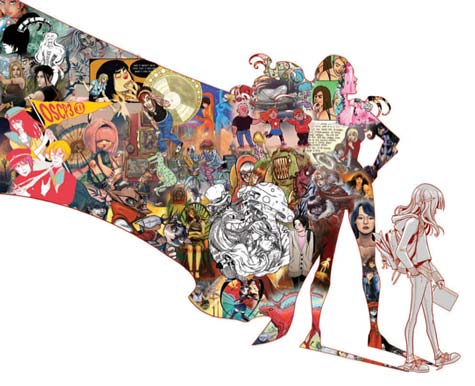Over at Publishers Weekly, for the second year in a row, Todd Allen asked “Is Kickstarter the #2 Graphic Novel publisher?”
And the answer is “No, it is not.”
First off, to be blunt, Kickstarter isn’t a publisher. Of any kind. I don’t mean to be glib, but it’s a major point Allen skips over. Kickstarter is a funding source. It is a way for people to make start-up capital for their projects. I guess a publisher could be described as a funding source, in that it pays artists and writers to make books, but the publisher also edits books, and advertises them, and prints them, and distributes them.
If the point is that Kickstarter gives creators the money they need to live before they can sell their art, yes, that’s true, and in that way Kickstarter is better than, say, Image. Every comic at Image is, and always has been, creator-owned, and Image pays a very generous royalty scheme, but they don’t pay advances, which means if you want to eat in the year before your comic hits the shelves, you need to find money elsewhere. Like Kickstarter. But that doesn’t mean Kickstarter is a publisher. Otherwise you’ve have to say that Citibank is the #2 comics publisher, or day jobs are the #2 comics publisher, or very supportive parents are the #2 comics publisher in the world.
But even if we limit the discussion to who funds more comics material in a month, Kickstarter or DC Comics, we’d have to compare like numbers to like, which Allen does not do. Allen even admits it’s an apples to oranges comparison, but continues anyway.
He has the amount Kickstarter raised during a three month period, but Kickstarter campaigns are not just pre-sales. Some comes from sales of ancillary material and some just from the generosity of fans. And he averages in the completely unaverage $1,000,000 Order of the Stick campaign, which is ten times more successful than any other graphic novel campaign on Kickstarter.
None of which relates to the number he uses for DC Comics, which is the net income DC received from selling graphic novels at comic book stores. That doesn’t include the amount DC made selling single issue comic books in the comic book stores (of which they sell over fifty two, everymonth), or any sales in prose bookstores (who buy up all those copies of Watchmen), and totally ignores that for every dollar DC makes in publications, they make two in licensing.
So DC’s net income from selling graphic novels at comic book stores and Kickstarter’s total fundraising for comics projects are barely related. If Allen knew how many Kickstarter projects were actually published in a month, and what the average page rate was for each project, then compared that to how much new material DC Comics put out that same month, and their page rates, then we could actually compare. But he doesn’t have that information, so he can’t.
Are a lot of comics projects being funded through Kickstarter? Yes. Are they being published by, on, or for Kickstarter? No. Are projects funded through Kickstarter outselling DC Comics, or Image, or Dark Horse? No.
I think this week’s Penny Arcade announcement makes it clear that, more and more, comics creators are going to use Kickstarter as an alternative revenue stream, and it will certainly change the economics of the field. But is Kickstarter a major comic book publisher? No.
Kickstarter is not a publisher. At all.
Steven Padnick is a freelance writer and editor. By day. You can find more of his writing and funny pictures at padnick.tumblr.com.










